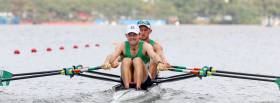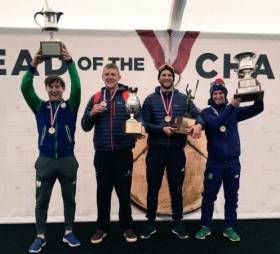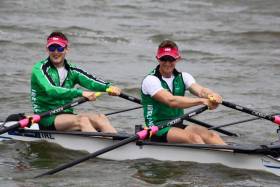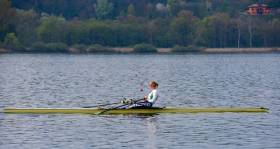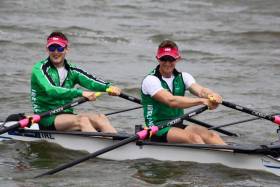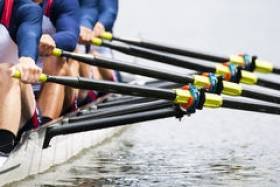Displaying items by tag: O'Donovans
O'Donovans Back on Track And Into European Final
#Rowing: Ireland’s Paul O’Donovan and Gary O’Donovan took an excellent second place behind Olympic champions France to secure their place in the A Final of the lightweight double sculls at the European Rowing Championships in Racice today. France were outstanding throughout the 2,000 metres and won by a length. Ireland were sixth at 500 metres, but began to move up the field in the second quarter. They moved through Greece and Germany before the end and saw off a challenge by the Germans coming up to the line – by eight hundredths of a second.
Italy won the second semi-final from Britain and Poland – but in a much slower time.
European Rowing Championships, Day Two (Selected Results; Irish interest)
Men
Lightweight Double Sculls – Semi-Final One: 1 France (P Houin, J Azou) 6:35.68, 2 Ireland (G O’Donovan, P O’Donovan) 6:38.09, 3 Germany (L Schaefer, J Osborne) 6:38.17; 4 Czech Republic 6:41.86, 5 Greece 6:49.59, 6 Spain 7:02.70.
Semi-Fnal Two: 1 Italy 6:43.71, 2 Britain (P Chambers, W Fletcher) 6:45.29, 3 Poland 6:46.49.
Women
Lightweight Single Sculls – Semi-Final One: Switzerland (P Merz) 7:39.48, 2 Ireland (D Walsh) 7:42.53, 3 Italy (C Guerra) 7:43.99.
Semi-Final Two:
1 Sweden (E Fred) 7:36.74, 2 Russia (A Lebedeva) 7:37.90, 3 Germany (L Pieper) 7:42.46.
#Rowing: The Ireland lightweight double of Paul and Gary O’Donovan finished second in their heat at the European Rowing Championships in Racice in the Czech Republic today. Only the winner of each of the four heats qualified directly for the A/B semi-finals. Russia dominated early on, but the second half of the race belonged to Poland. As Russia faded, they opened a lead of over three seconds over Ireland, and despite a charge by the men in green they never looked other than winners.
France, Germany and Italy won their heats well.
European Championships, Racice, Czech Republic, Day One (Selected Results; Irish interest)
Men
Lightweight Double Sculls – Heats (Winner to A/B Semi-Finals; rest to Repechages) – Heat One: 1 France (P Houin, J Azou) 6:26.97. Heat Two: Germany (L Schaefer, J Osborne) 6:37.53.
Heat Three: 1 Poland 6:25.93, 2 Ireland (G O’Donovan, P O’Donovan) 6:32.15, 3 Russia 6:36.38, 4 Switzerland 6:40.60, 5 Austria. Heat Four: 1 Italy 6:30.77.
Women
Lightweight Single Sculls – Heat One (First Three to Semi-Finals; rest to Repechage): 1 Ireland (D Walsh) 7:44.85, 2 Denmark (A Runge Holmegaard) 7:49.49, 3 Poland (J Dorociak) 7:49.90; 4 Czech Republic 8:05.07, 5 Portugal 8:08.19. Heat Two: 1 Switzerland 7:42.510. Heat Three: 1 Sweden 7:39.52.
More Rowing Glory for O'Donovan Brothers
#Rowing: Paul and Gary O’Donovan have another set of medals to add to their 2016 collection. Sculling with John Collins and Jonny Walton of Leander (the British Olympic double) they had the fastest raw time in the Directors’ Challenge Men’s Quads at the Head of the Charles Regatta in Boston. While the result was given as a win for “Fruit Loops”, a Masters crew which was given a handicap, the Irish/British crew were presented with the medals.
In 2016 Gary and Paul won gold at the European Championships, silver at the World Cup Regatta in Italy, silver at the Olympic Games, and took winners’ medals at the Irish Open as a double. Paul also won gold at the World Championships as a lightweight single sculler and won the Irish Open single sculls.
Puspure and Friends Best at Boston Rowing Regatta
#Rowing: Sanita Puspure was part of the top women’s crew at the Head of the Charles Regatta in Boston. The Old Collegians rower took the honours in the Women’s Championship Eights, with a crew of the top scullers in the world, stroked by American Genevra Stone.
Paul and Gary O’Donovan finished second in their final race, the Directors’ Challenge Men’s Quads. The Skibbereen men teamed up with John Collins and Jonathan Walton of Leander to form a crew which they called Crossing the Pond.
Head of the Charles River, Boston (Irish interest; selected results)
Saturday
Men
Championship Doubles: 8 P O’Donovan, G O’Donovan 17 min 39.742 seconds.
Women
Championships Doubles: 1 K Brennan, E Twigg 18:08.7, 2 M Lobnig, S Puspure 18:20.219.
Sunday (Provisional)
Men
Directors’ Challenge Quads: 2 Crossing the Pond (G O’Donovan, J Walton, J Collins, G O’Donovan) 16:30.304.
Women
Championship Eights: 1 Cambridge (S Puspure, M Knapkova, M Lobnig, J Gmelin, C Zeeman, E Twigg, K Brennan, G Stone; cox: E Driscoll) 16:30.368.
Ireland Crews Wait As Weather Forces Rowing Cancellation
#Rowing: The Olympic rowing programme for today, Sunday, has been postponed. The strong crosswinds disrupted a number of races on Saturday and left the Serbian men's pair in the water after a capsize. Ireland single sculler Sanita Puspure had complained about the conditions, saying the boats would not be put out to train in such difficult waters. Two Ireland boats, the women’s lightweight double of Sinead Lynch and Claire Lambe and the men’s lightweight double of Paul and Gary O’Donovan were due to compete in their first race today, but must now wait.
O'Donovans Take Place in Lucerne Semi-Final
#Rowing: Ireland qualified directly for their second semi-final of the morning at the World Cup in Lucerne as Paul and Gary O’Donovan took second in their heat of the lightweight double sculls. South Africa, the crew with the world’s best time, led all the way and won. Ireland took over in second by half way and finished under a second behind the South Africans. They held off a push by Switzerland in the final quarter. The Swiss also qualified.
World Cup Regatta, Lucerne, Switzerland (Irish interest, selected results)
Men
Lightweight Double Sculls – Heats (Three to A/B Semi-finals; rest to Repechage) – Heat One: 1 South Africa 6:21.98, 2 Ireland (G O’Donovan, P O’Donovan) 6:22.89, 3 Switzerland One 6:31.36; 4 Japan One 6:38.28, 5 Angola 6:55.06. Heat Two: 1 France One 6:20.94, 2 Poland One 6:25.55, 3 Brazil 6:35.48. Heat Three: 1 Norway 6:21.26, 2 United States 6:23.33, 3 Britain 6:37.22.
Women
Lightweight Double Sculls – Heats (Two to A/B Semi-Finals; rest to Repechage) – Heat One: 1 South Africa 6:57.90, 2 China Two 7:01.11. Heat Two: 1 Canada 6:56.56, 2 China One 6:57.98.
Heat Three: 1 New Zealand 7:00.16, 2 Ireland (C Lambe, S Jennings) 7:01.90; 3 Germany One 7:05.79, 4 Russia One 7:06.01, 5 Chile One.
#Rowing: Single sculler Sanita Puspure and the men’s lightweight double scull won their semi-finals to bring Ireland’s A Final tally to four at the European Rowing Championships in Brandenburg in Germany. The Ireland women’s lightweight double had to settle for a B Final place.
Paul O’Donovan and Gary O’Donovan produced an excellent finishing sprint to win their semi-final. Germany had led them down the course but the Cork brothers outpaced them in the dash to the line.
Puspure won a really good race, Nataliya Dovgodko of the Ukraine and and Lina Saltyte of Lithuania looked impressive in the first half in the tough, cross-headwind conditions, with Puspure also in the top three. Mirka Knapkova moved from fourth in the final seven hundred metres to dispute the lead, but Puspure finished strongly and kept her in second. Saltyte took third.
Sinéad Jennings and Claire Lambe finished fifth in their semi-final. Poland were impressive winners, with Denmark holding second for much of the race and Ireland disputing third with Romania. Britain pushed into the top four in the second half, but could not secure a top-three place. Romania pushed into second, ahead of Denmark. Britain finished fourth, one place ahead of Jennings and Lambe.
European Championships, Brandenburg, Germany – Day Two (Selected results, Irish interest)
Men
Lightweight Pair – Repechage (First Four to A Final; rest to B Final): 1 Denmark 7:26.63, 2 Ireland (M O’Donovan, S O’Driscoll) 7:27.99, 3 Germany 7:29.0, 4 Portugal 7:29.70.
Lightweight Double Sculls – Semi-Final One (First Three to A Final; rest to B Final): 1 Ireland (G O’Donovan, P O’Donovan) 7:00.52, 2 Germany 7:00.7, 3 Poland 7:08.37.
Women
Lightweight Double Sculls – Semi-Final Two (First Three to A Final; rest to B Final): 1 Poland 7:57.60, 2 Romania 8:01.47, 3 Denmark 8:03.45; 5 Ireland (C Lambe, S Jennings) 8:12.30
Single Sculls – Semi-Final One (First Three to A Final; rest to B Final): 1 Ireland (S Puspure) 8:44.67, 2 Czech Republic (M Knapkova) 8:45.61, 3 Lithuania (L Saltyte) 8:47.70.
Lightweight Single Sculls – Repechage (First Two to A Final; rest to B Final): 1 Ireland (D Walsh) 8:39.41, 2 Britain (I Walsh) 8:41.08.
O'Donovans Win Heat at European Championships
#Rowing: Gary and Paul O’Donovan won their heat of the lightweight double sculls at the European Championships in Brandenburg in Germany. The Czech Republic showed well early on, but by halfway the brothers from Skibbereen had a small lead, which they extended from there on. As the Czechs faded, Belgium strengthened, and they took second. Switzerland edged out the Czechs for the third direct qualification place.
Sinéad Jennings and Claire Lambe took second in their heat of the lightweight double to qualify for the semi-finals. With Ukraine stuck in fourth place, the Netherlands, Ireland and Germany were set for the semi-final places, but fought it out before finishing in that order.
Denise Walsh finished fifth in her heat of the lightweight single sculls and must compete in a repechage. In the men’s lightweight pair, the world champions, Sam Scrimgeour and Joel Cassells of Britain, won their heat and took the A Final place. The Ireland crew of Mark O’Donovan and Shane O’Driscoll held second right down the course and sprinted to the line to hold off a challenge by Poland.
European Championships, Brandenburg, Germany – Day One (Selected results, Irish interest)
Men
Lightweight Pair – Heat One (Winner to A Final; rest to repechage): 1 Britain (S Scrimgeour, J Cassells) 6:59.29; 2 Ireland (M O’Donovan, S O’Driscoll) 7:06.20.
Lightweight Double Sculls – Heat Two (First three to A/B Semi-Finals; rest to repechage): 1 Ireland (G O’Donovan, P O’Donovan) 6:46.75, 2 Belgium 6:49.46, 3 Switzerland 6:51.12.
Women
Quadruple Sculls – Heat One (Winner to A Final; rest to repechage): 3 Britain (3: H Nixon) 6:48.20.
Single Sculls – Heat One (First three to A/B Semi-Finals; rest to repechage): 1 Ireland (S Puspure) 8:09.55, 2 Latvia (E Gulbe) 8:13.73, 3 Britain (M Hodgkins-Byrne) 8:16.21.
Lightweight Double Sculls – Heat Three (First three to A/B Semi-Finals; rest to repechage): 1 Netherlands 7:29.38, 2 Ireland (C Lambe, S Jennings) 7:34.04, 3 Germany 7:38.89.
Lightweight Single Sculls – Heat One (First Two to A Final; rest to repechage): 1 Denmark 8:23.99, 2 Poland 8:25.82: 5 Ireland (D Walsh) 8:35.99.
O'Donovan Brothers Take Winning Route to A Final
#Rowing: Gary and Paul O’Donovan confidently took their place in the A Final of the lightweight double sculls at the World Cup regatta in Varese in Italy. The brothers from Skibbereen matched their winning performance in Friday’s heat, taking over the lead in the middle of the race and having over a second to spare over the second-placed Netherlands crew at the finish.
World Cup Regatta, Varese – Day Two (Selected Results, Irish interest)
Men
Lightweight Four – C Final (places 13 to 16): 1 Canada One 6:09.73, 2 Serbia 6:11.21, 3 Austria 6:15.85, 4 Ireland (L Seaman, M O’Donovan, L Keane, S O’Driscoll) 6:16.00.
Lightweight Double Sculls – A/B Semi-Finals (First Three to A Final; rest to B Final) – Semi-Final One: 1 Ireland (P O’Donovan, G O’Donovan) 6:19.57, 2 Netherlands One 6:20.69, 3 Belgium One 6:20.85; 4 Poland One 6:22.21, 5 Switzerland One 6:24.99, 6 Portugal One 6:51.45.
Women
Pair – C Final (places 13 to 16): 1 Norway One 7:22.74, 2 Ukraine 7:23.16, 3 Ireland (L Kennedy, B O’Brien) 7:33.07.
Single Sculls – A/B Semi-Finals (First Three to A Final; rest to B Final) – Semi-Final One: 1 Ireland (S Puspure) 7:26.60, 2 Belarus Two (T Kukhta) 7:27.86, 3 Canada (C Zeeman) 7:29.01; 4 Ukraine 7:30.70, 5 Sweden 7:37.22, 6 Latvia 7:37.48. Semi-Final Two: 1 Belarus 7:29.10, 2 Switzerland 7:29.93, 3 China 7:31.28.
Lightweight Double Sculls – C Final (places 13 to 17): 1 Ireland (C Lambe, S Jennings) 7:17.24, 2 Italy Three 7:26.29, 3 Chile 7:29.71.
Lightweight Single Sculls – Repechage (First Two to A Final; rest to B Final): 1 Poland Two 7:49.90, 2 Switzerland One 7:51.76; 5 Ireland Two (S McCrohan) 8:04.69, 6 Ireland One (D Walsh) 8:08.81
O'Donovans Give Ireland Second Heat Win at World Cup Regatta
#Rowing: Ireland had its second heat win at the World Cup Regatta in Varese, as the lightweight double of Paul O’Donovan and Gary O’Donovan gave an excellent display. They took over the lead in the second half of the race and beat Britain into second place, with both crews qualifying for semi-finals.
Sinéad Jennings and Claire Lambe finished third in their heat, missing direct qualifcation for the semi-finals by just one spot. The Ireland lightweight double were very close to leaders Switzerland down the course, but in the drive for the line Canada took the second qualification place, with Ireland .55 of a second behind.
World Cup Regatta, Varese (Selected Results, Irish interest)
Men
Lightweight Double Sculls – Heat Three (First Two to A/B Semi-Final; rest to Repechages): 1 Ireland (P O’Donovan, G O’Donovan) 6:27.07, 2 Britain 6:33.38; 3 Netherlands Two 6:48.24.
Women
Pair – Heat One (First Two to A/B Semi-Final; rest to Repechages): 1 Germany 7:23.08, 2 Russia One 7:24.46; 5 Ireland (L Kennedy, B O’Brien) 7:46.38.
Lightweight Double Sculls – Heat Two (First Two to A/B Semi-Final; rest to Repechages): 1 Switzerland 7:03.98, 2 Canada 7:04.45; 3 Ireland (C Lambe, S Jennings) 7:05.0.
Single Sculls – Heat One (Winner to A/B Semi-Finals; rest to Repechages): 1 Ireland (S Puspure) 7:34.32; 2 Czech Republic (M Knapkova) 7:36.13.


























